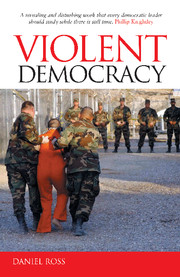Book contents
Chapter 6 - Enemy Combatants
Published online by Cambridge University Press: 22 September 2009
Summary
Historians debate whether the first camps to appear were the campos de concentrationes created by the Spanish in Cuba in 1896 to suppress the popular insurrection of the colony, or the “concentration camps” into which the English herded the Boers toward the start of the century. What matters here is that in both cases, a state of emergency linked to a colonial war is extended to an entire civil population. The camps are thus born not out of ordinary law (even less, as one might have supposed, from a transformation and development of criminal law) but out of a state of exception and martial law.
Giorgio AgambenAt the end of the nineteenth century the United States of America was preoccupied with war. The Spanish—American War of 1898 was no great military affair, unwished for by the governments of either nation, and featured little in the way of important battles. Yet the war was a significant early demonstration of the power the United States had achieved, and as an indication of the future directions that power would take. It made clear that no European power would be able to defend any territory in the Americas against United States military aggression. Having made its demonstration clear, America did not hold back from dominating the region.
The war was largely a battle for Cuba, fought between the old empire that controlled things politically (Spain), and the emerging empire that already controlled Cuba economically (America).
- Type
- Chapter
- Information
- Violent Democracy , pp. 124 - 150Publisher: Cambridge University PressPrint publication year: 2004



